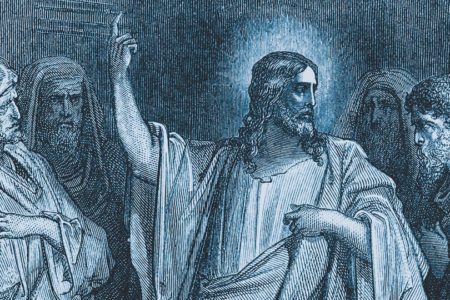Thankful for the Thessalonians
1 Thessalonians 1:2–4
When kindness is shown to someone, the usual response is to say thank you. No New Testament writer other than Paul expressed thankfulness to his fellow Christians. He opened every epistle except Galatians with thanksgiving.
Paul was thankful for the Thessalonian believers for three things in particular:
- Their salvation in Christ (1 Th. 1:2–5).
- Their service to Christ in the midst of great opposition and persecution (vv. 6–10).
- Their sanctification in Christ. The Thessalonians were exhibiting great faith and spiritual growth in the midst of affliction (3:1–13).
After his abrupt departure from them, Paul agonized over the Thessalonians’ spiritual and physical conditions. Timothy’s encouraging report about their commitment to the Lord motivated Paul to immediately pen a letter of thanksgiving, praise, and personal love for the believers in Thessalonica.
Praise for the Thessalonians
It was the apostle’s pattern to begin his prayer with praise: “We give thanks to God always for you all, making mention of you in our prayers” (1:2). Christians often rush into God’s presence with a list of petitions and never thank Him for answered prayer.
In using the word we, Paul seems to have included Silvanus and Timothy, who are also mentioned in verse 1. Naturally, they, too, were thankful the Thessalonians received salvation through faith in Jesus Christ as their Savior.
Paul’s thanksgiving was to God first and then to the Thessalonians. This is as it should be because God, not Paul, effected their salvation. It must be remembered that salvation is God’s gift to everyone who believes in Christ. Salvation always comes from God’s unmerited favor through faith, not from any work on the part of the individual (Eph. 2:8–9).
As believers, we should practice thanksgiving continually: “We give thanks to God always” (1 Th. 1:2). The words give thanks are present tense and speak of a daily, moment-by-moment practice, whether in times of sadness or gladness. Paul commanded all believers, “In everything give thanks; for this is the will of God in Christ Jesus for you” (5:18).
Thanksgiving is also comprehensive, “for you all” (1:2). Though Christians differ greatly in their abilities and commitments, we should be thankful for all believers because we are brothers and sisters in Christ and can draw on one another for friendship and fellowship in times of need.
Paul offered the Lord consecrated prayer on behalf of the Thessalonians, “making mention of you in our prayers” (v. 2). He often linked thanksgiving and prayer (cf. Phil. 4:6; Col. 1:3; 4:2; 1 Tim. 2:1; 2 Tim. 1:3; Phile. 4). The word prayer refers to petitions offered on behalf of individuals or churches. Silvanus, Timothy, Paul, and others probably were praying for this young church with thanksgiving, as well as with supplications for protection and growth. This is a model to follow when praying. Thanksgiving to God should always come before petitions.
Prayer for the Thessalonians
Paul gave three reasons why he and his companions were thankful for the Thessalonians: “Remembering without ceasing your [1] work of faith, [2] labor of love, and [3] patience of hope in our Lord Jesus Christ in the sight of our God and Father” (1 Th. 1:3).
These three pairs of nouns describe a logical progression of the Christian experience. Their love for Christ motivated their work for Him and produced hope during persecution.
In other words, Paul remembered the Thessalonians’ work, labor, and patience. These nouns are modified by the words faith, love, and hope respectively. Together, they reveal the Thessalonians’ dedication, diligence, deeds, and determination to persevere for the Lord despite opposition.
This is the first time Paul chronologically used these three key words (faith, love, hope) of the Christian faith in his epistles.
The word your refers specifically and emphatically to the Thessalonians alone.
1. Work of Faith
Whatever they undertook, they accomplished by exercising faith—not saving faith but, rather, daily faith in Christian living. Their faith energized them to work for Christ. True faith should produce a life of good works in believers (cf. Jas. 2:26).
2. Labor of Love
Labor speaks of toiling to the point of exhaustion in working for the Lord. The Thessalonians did so in love. The Greek word for “love” here is agape, the highest, most selfless form of God’s love, as expressed by Christ when He gave His life on the cross. The Thessalonians’ deep, self-sacrificing love for God motivated them to labor for Him.
Although the type of labor they did is not stated, some have speculated they helped Christians undergoing severe persecution and privation. Others believe they helped spread the gospel.
3. Patience of Hope
Patience speaks of endurance and perseverance through trials, persecution, and conflict. This church continually faced government, pagan, and Jewish persecution. The hope that sustained them was not merely a wish or unfounded optimism, as many people today view the word hope. Biblical hope is a strong, settled conviction based on the sure promises of God in His Word. It is the eschatological hope of Christ’s return, mentioned throughout this epistle and 2 Thessalonians.
Their hope was “in our Lord Jesus Christ in the sight of our God and Father” (1 Th. 1:3). Their faith gave them the endurance and fortitude to withstand their circumstances.
Faith, love, and hope all have Christ as their object. These words also appear in the logical order of the Christian experience: Faith speaks of our past in coming to Christ; love, of our present in appreciating all Christ means to us; and hope focuses on the future, as we anticipate the Lord’s return. In the context of verse 3, the emphasis is on hope.
It has been said, “Faith looks back to a crucified Savior. Love looks up to a crowned Savior. Hope looks for a coming Savior.”
Paul used the Son of God’s full title, “Lord Jesus Christ,” encompassing all He is and will do. With the word our, Paul included himself among his readers, indicating such hope is for all believers.
Some commentators connect the phrase in the sight [before or presence] of our God and Father to the word remembering at the beginning of verse 3, meaning the believers’ works of faith, labor of love, and patience of hope were continuously and consciously in the presence of God who watched over the believers, protected them, and witnessed the authenticity of their commitment.
Other commentators limit the phrase to the word hope. Thus their hope was centered in the Lord Jesus Christ’s promise to return. This hope was the focus of their lives. They waited for it patiently, and it gave them standing in the presence of God their Father. Though living in God’s presence, one day their hope would be fulfilled when they were physically standing before Him.
Scholars disagree on which interpretation is correct and what Paul had in mind when he penned the phrase.
Position of the Thessalonians
Paul was thankful for the Thessalonians because he knew God chose them: “knowing, beloved brethren, your election by God” (v. 4).
The Greek word Paul used here for “know” is oida. It refers to knowledge gained by perception or intuition and identifies the Thessalonians’ genuine faith and possession of eternal life.
Paul described the Thessalonians as “beloved brethren” (v. 4). The word beloved expresses Paul’s deep affection for these Christians. The verb is in the Greek perfect tense and denotes a love that existed in the past but continues—a permanent object of divine love.
Those involved in evangelizing the Thessalonians are assured of their “election.” Election (Greek, ekloge) means to choose out from others. Election is the free, righteous, kind, and sovereign act of almighty God in grace, whereby He selected certain people from the human race (Jn. 15:19) for Himself before the foundation of the world (Eph. 1:4).
Election is used in the New Testament to describe God’s selection of individuals to have a special, saving relationship with Him (Rom. 9:11; 11:5, 7, 28; 1 Th. 1:4; 2 Pet. 1:10). Election is not due to merit, works, intelligence, noble birth, ability, riches, or power within an individual or nation (1 Cor. 1:26–29). Election is exclusively in God’s sovereign will and for His divine purpose.
Why God chooses one person or nation over another transcends the knowledge of man. His choosing is a mystery of His will, and He selects “according to His good pleasure which He purposed in Himself” (Eph. 1:9). Remember, however, election does not negate individual responsibility to respond and receive Jesus Christ as Savior and Lord (1 Th. 1:6, 9). Scripture also teaches, “For ‘whoever calls on the name of the Lord shall be saved’” (Rom. 10:13).
Here is a question all of us must ask ourselves: Am I following Paul’s admonition to be thankful in all things, especially God’s love and presence in my life? Think about it!








